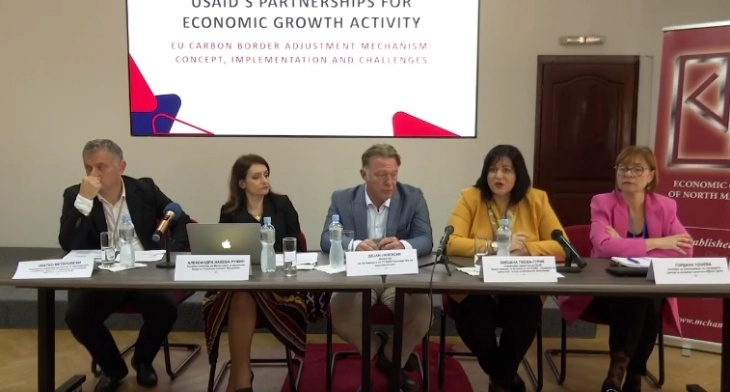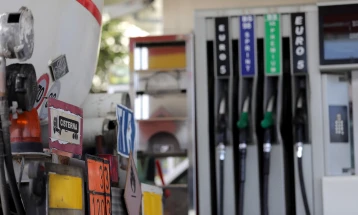EU Carbon Border Adjustment Mechanism presented at Economic Chamber event
- The European Union’s Carbon Border Adjustment Mechanism (CBAM), whose main goal is to enable a fair price on the carbon emitted during the production of carbon intensive goods that are entering the EU and to encourage cleaner industrial production in non-EU countries, was presented to representatives of the private and public sector in the country at an event held Thursday at the Economic Chamber of North Macedonia.
- Post By Angel Dimoski
- 14:10, 26 October, 2023

Skopje, 26 October 2023 (MIA) – The European Union’s Carbon Border Adjustment Mechanism (CBAM), whose main goal is to enable a fair price on the carbon emitted during the production of carbon intensive goods that are entering the EU and to encourage cleaner industrial production in non-EU countries, was presented to representatives of the private and public sector in the country at an event held Thursday at the Economic Chamber of North Macedonia.
The informative event titled “EU Carbon Border Adjustment Mechanism: Concept, Implementation and Challenges” is a part of the USAID Partnerships for Economic Growth activity, organized in collaboration with the Center for Development Policies IDEAS DePo, and the Economic Chamber.
At the event, Gordana Tosheva, trade expert at the Center for Development Policies IDEAS DePo, noted that the implementation of CBAM by the EU creates many challenges, as well as opportunities for Macedonian companies.
“Above all these are challenges faced by the private sector, i.e., companies that are exporting to the EU in the sectors that are affected by CBAM since it could seriously put their competitiveness into question. It will require of them to adapt to the new conditions for access to the European market and to see where their place is in the possible restructuring of the regional and global value chains,” said Tosheva at the event.
“Apart from that,” she added, “CBAM also creates many opportunities because it is a potential reform which in a way will encourage the country to intensify its implementation of policies in the fight against climate change and for a green transition of our industrial capacities.”
The head of the USAID Partnerships for Economic Growth activity, Dejan Janevski, said that their fundamental goal is to improve the productivity of micro, small and medium-sized enterprises in the country.
He stressed that in the past two to three years, as a result of Covid-19 and the wars in Europe and elsewhere, the conditions in which the private sector operates have become quite complicated. “An additional complication for the private sector,” he added, “is the introduction of CBAM in the EU.”
“That’s why it is very important that we begin timely preparations for its introduction, especially for the smaller companies, since the larger companies have the capacities and people who can focus on that,” said Janevski.
The Operations Director at the Economic Chamber, Biljana Peeva-Gjurikj, noted that one of the Chamber’s key priorities is to encourage exports and assist companies which are exporting goods.
“That’s why it is necessary for us to follow the developments, because we know that CBAM in a way represents a cornerstone of the European Green Deal and the Green Agenda for the Western Balkans, something which we will also have to adjust to and comply with even though we are not an EU member state, because its basic goal is fighting against climate change,” stressed Peeva-Gjurikj.
At the event, the Assistant Director for International Cooperation at the Customs Administration, Zlatko Veterovski, presented the basic characteristics of CBAM and its implications on the Macedonian economy and exports, in order to allow a timely preparation from businesses for the introduction of the Mechanism on January 1, 2026.
The representatives of the private and public sector also had a chance to get acquainted to the country’s tax policy regarding the Mechanism, which was presented by Aleksandra Nakeva-Ruzin, Special Advisor to the Minister of Finance.
Photo: MIA







